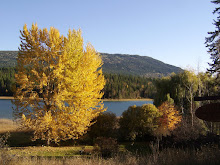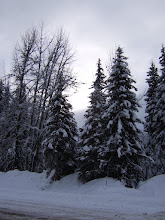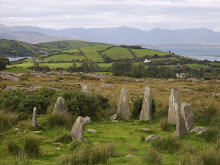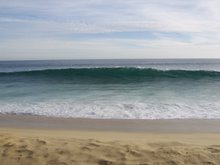December 21, 2007
“It’s turtles all the way down” (Sagan or Hawking?)
The morning to leave the Cabo beaches is always a sad time, but made less so this time because of the coming weeks in Puerto Morelos on the Yucatan coast, with Crescent, William, their unborn first, and the turquoise Caribbean.
I walk down to the beach to take pictures of the sand; coarse-grained, speckled with a few shells, but mostly eroded and eroding granite, with pink and white feldspars, white and grey quartz, and miniscule amounts of amphibole. It’s coarse sand, stacked high into a winter berm with a different gradient every year. This year the berm is so high and the ocean-side so steep, that from the top you cannot see clear to the crashing waves on the west side of the arches. I don’t swim here, gravity rules in the undertow and I am neither that courageous nor stupid. The sand is marvelous though, as it rasps pleasantly against the toes and heels, deep and permeable, golden and shining in the early morning sun.
An arc of about 30 people, open to the sea, stands on the berm slope, about half way down the beach; are they watching whales? Not in that configuration. I get closer to see the small dark ovals between the arc and the water, no more than 2-3 inches long, with flailing flippers and tiny heads, and it is a hatching of baby turtles from the protected nests on the upper surface of the berm. Mama turtles had dug those nests out of reach of tide, surf, even storms. Possible only a hurricane-driven storm surge and massive waves could breach their sanctuary and wash away in a single rush, all their effort of climbing this surface, digging their nest, and then laying hundreds of ping-bong ball size eggs.
The stronger waves run far up the sand and catch the nearest babies in their froth, and we see leathery backs and little flippers flip and flop until they are either washed out with the undertow, to be seen no more, or are left behind in the damp, to await the next life-giving surge. In the meantime, pelicans cruise the surf line, but perhaps they have already breakfasted this morning, as they do not seek out the tender hatchlings. The statistics tell us that about one in one million baby turtles survive to adulthood, a life span nearly as long as that of a healthy human.
We are quiet and awe-struck, cameras clicking, videos purring, as we witness one of nature’s extraordinary adventures in procreation and survival.
Sunday, December 23, 2007
Subscribe to:
Post Comments (Atom)




















































No comments:
Post a Comment